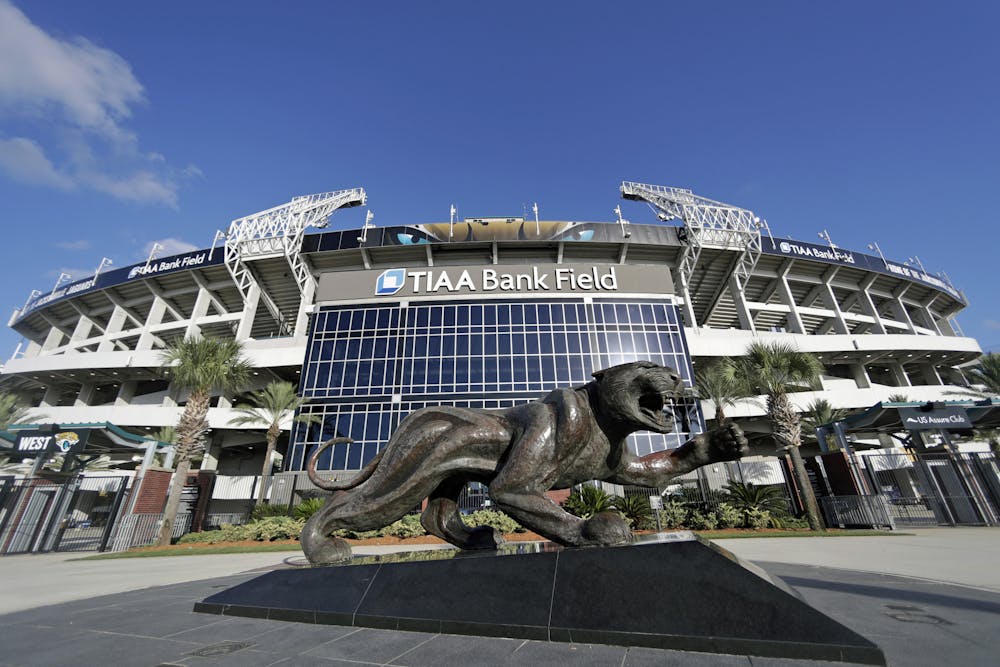The neutral-site game is one of college football’s dying arts.
In the age of drastic changes to college football, many teams are moving away from the concept. Few neutral-site rivalries — the Red River showdown, Army vs. Navy — as well as one-off neutral site events serve as the lingering examples of an old tradition.
Florida-Georgia is one of those examples. However, the existence of the rivalry is more than just the biggest athletic event of the year for each school. It’s also arguably the most important event in its host city: Jacksonville.
Alongside the game, multiple events are hosted by the city throughout the weekend to attract tourists and vendors alike. Florida-Georgia has been played in the River City every year since 1933, excluding two seasons when it temporarily shifted to Gaiesville and Athens. The games in 1994 and 1995 couldn’t be play in Jacksonville since major stadium renovations were necessary to house the city’s newly awarded NFL expansion team: the Jacksonville Jaguars
While the game is contracted to remain in Jacksonville until 2025, talks of moving the game are increasing Georgia head coach Kirby Smart has made it clear he’d rather the game split time in either team’s home stadium.
Smart recognizes the game is special, but claims the game being away from Athens hurts UGA’s recruiting.
“It’s an opportunity for us to bring these kids who fly in from all over the country,” Smart told SEC Now at Southeastern Conference media days. “What game do they want to see? They’d like to see Georgia play Florida, but they can’t do that.”
There’s certainly a case to be made for moving the game to a home-and-home format. However, the impact the game and the weekend as whole has on the city of Jacksonville is undeniable and is a necessity for the city’s economy.
Jacksonville mayor Lenny Curry told Action News Jax in 2021 the game has an economic impact of at least $30 million.
In 2015, the Jacksonville Daily Record reported on a city survey estimating the game produces a 10-to-1 return on investment to the city.
"The positive results from the annual Florida-Georgia game underscore the importance of this event to our community," Curry said in a 2015 statement. "This event drives economic impact benefits and amplifies our community as a leading destination for major events."
Another wrinkle in the negotiations to keep or move the game from Jacksonville is the forthcoming mayoral election. Curry, the incumbent, has reached his term limit and will be ineligible to run for reelection. The mayoral election is set for March 2023.
Ahead of this year’s contest, Florida and Georgia released a joint statement regarding questions about the future of the game.
“The annual game between our two universities is an important tradition. At this time, both programs are focused on our current seasons,” the statement said. “Typically both schools begin conversations regarding future games in the series as the last contracted game nears. We anticipate following that timeline.”
College football’s landscape changes on a near-daily basis. As new traditions are formed right before the eyes of the sport’s audience, old traditions will die off.
For Jacksonville, the relocation of Florida-Georgia would mean much more than lost tradition. It would mean lost jobs, lost opportunities and a lost event that is a signature of the city. Without the game, there’s a hole in the city’s identity.
This year’s rendition of the rivalry kicks off Saturday, Oct. 29 at 3:30 p.m in TIAA Bank Field. The game will be broadcast on CBS.
Contact Jackson Castellano at jcastellano@alligator.org. Follow him on Twitter @jaxacastellano.
Jackson Castellano is a third-year sports media journalism student and the Digital Managing Editor at The Alligator for Spring 2024. In the past, he's served as the Sports Editor, Assistant Sports Editor and a Sports Reporter covering Football, Men's basketball and Baseball.






